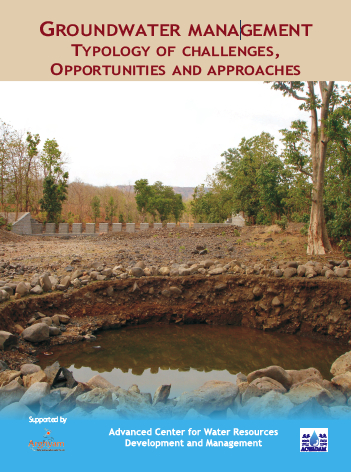Irrigation
An innovative way of sharing diminishing groundwater introduced by APDAI
Posted on 27 Mar, 2010 12:55 PM“We no longer worry about the rains. We now have the confidence to grow alternative crops even if the monsoon fails,” said Balaraju, a farmer in one of the most drought-prone and economically vulnerable regions of Andhra Pradesh in southern India.
Barrages as a better alternative to Polavaram dam project
Posted on 20 Mar, 2010 06:34 PMBARRAGES AS A BETTER ALTERNATIVE TO POLAVARAM DAM POJECT
(Replies to Discussion Report of Advisory Committee on alternate proposals made for
Polavaram project by Sri.T.Hanumantha Rao, former Engineer-in-Chief, AP State)
The wells brim with water in drought-prone Gujarat
Posted on 19 Mar, 2010 09:20 AMTHE WELLS of Kalawad village in Junagadh district, Gujarat brim with water. The reason — construction of check dams by a peasant, Mr.
Groundwater Management - Typology of challenges, approaches and opportunities - Research papers from the conference organised by ACWADAM and Arghyam at Pune (May 2009)
Posted on 17 Mar, 2010 04:40 AM A workshop on groundwater was organised by ACWADAM and Arghyam Trust in Pune in May 2009, that brought together several experts in the field, and explored diverse topics such as the importance of scale in groundwater resource planning and management, importance of aquifer typologies, participatory processes of groundwater management, groundwater regulation and groundwater linkages with watershed development, markets and policy matters.
A workshop on groundwater was organised by ACWADAM and Arghyam Trust in Pune in May 2009, that brought together several experts in the field, and explored diverse topics such as the importance of scale in groundwater resource planning and management, importance of aquifer typologies, participatory processes of groundwater management, groundwater regulation and groundwater linkages with watershed development, markets and policy matters.
The attempt of the workshop and research papers presented, was to highlight contemporary issues in groundwater management, and to look at it through the multiple lenses of hydrogeology, sociology, economics, livelihoods, environment, disasters and so on.
National seminar on increasing water efficiency in agricultural sector
Posted on 22 Feb, 2010 05:24 PMPress release from CII

More Crop per drop: Need of Agriculture today
“The challenge of managing our water resources in a rational and sustainable manner will require action on many fronts and coordination across different sectors of the economy” said Mr. A K Bajaj, Chairman, Central Water Commission and Ex-Officio Secretary to the Government of India, at the inaugural session of the National Seminar on Increasing Water Efficiency in Agriculture Sector organized by CII. Setting the tone of the deliberations he particularly emphasized on the need to address the complex issue through collaborative efforts of the industry and the Government.
Water-efficient sugarcane farming in Belgaum, Karnataka
Posted on 17 Feb, 2010 04:28 PMSuresh Desai is a founding member of an Organic Farmers Club in Belgaum District of Karnataka, India. It has 400 members, some of whom are already growing crops organically, while others are in the process of shifting to organic farming.
Since completing his matriculation, Suresh has been caring for the family property of 4.5 hectares, in an area where today sugar cane is primarily grown. For nearly a decade Suresh, as the manager of the farm, followed conventional practices relying on external inputs in the form of chemical fertilizers and pesticides. Just like most of the other farmers near Belgaum, he grew sugar cane, a high water-demanding cash crop, and tobacco.
Negotiating participatory irrigation management (PIM) - A research study from the Indian Himalayas
Posted on 05 Feb, 2010 04:15 PMThis research paper published in the Journal of Agricultural Water Management draws on a case study from a village in the Shiwalik region of the Indian Himalayas and identifies the role of diverse actors in exploiting historic and ecological factors to derail the Participatory Irrigation management (PIM) reforms to frame water management problems. The paper explores the inter-linkages between socio-cultural, institutional and ecological factors in derailing the PIM reforms. Participatory irrigation management (PIM) reforms are implemented in India to facilitate farmers’ participation in irrigation management, through water user groups.
Monthly magazine-Dams, Rivers & People, Sep-Oct 2009, Oct-Nov 2009, Dec 2009 - Jan 2010
Posted on 25 Jan, 2010 12:56 PM






